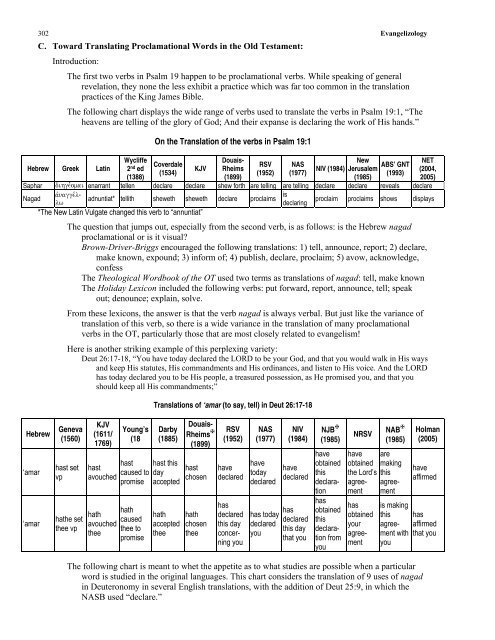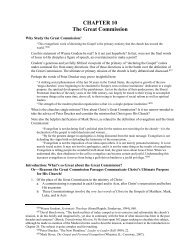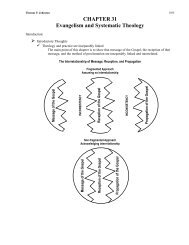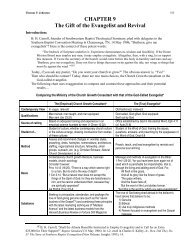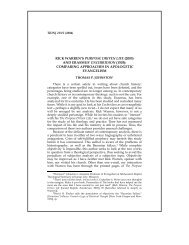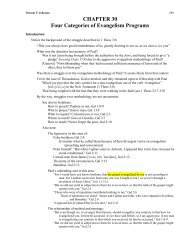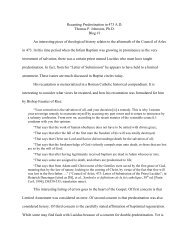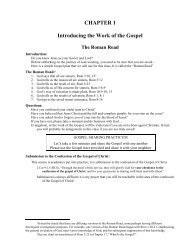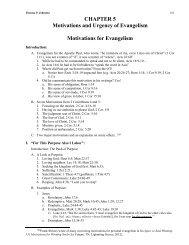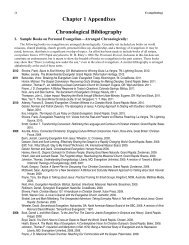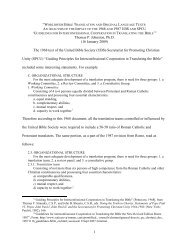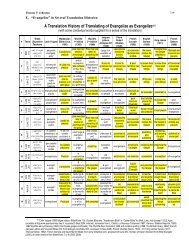CHAPTER 7 Defining Evangelizing - Evangelism Unlimited
CHAPTER 7 Defining Evangelizing - Evangelism Unlimited
CHAPTER 7 Defining Evangelizing - Evangelism Unlimited
Create successful ePaper yourself
Turn your PDF publications into a flip-book with our unique Google optimized e-Paper software.
302 Evangelizology<br />
C. Toward Translating Proclamational Words in the Old Testament:<br />
Introduction:<br />
The first two verbs in Psalm 19 happen to be proclamational verbs. While speaking of general<br />
revelation, they none the less exhibit a practice which was far too common in the translation<br />
practices of the King James Bible.<br />
The following chart displays the wide range of verbs used to translate the verbs in Psalm 19:1, “The<br />
heavens are telling of the glory of God; And their expanse is declaring the work of His hands.”<br />
On the Translation of the verbs in Psalm 19:1<br />
Hebrew Greek Latin<br />
Wycliffe<br />
2nd ed<br />
(1388)<br />
Coverdale<br />
(1534)<br />
KJV<br />
Douais-<br />
Rheims<br />
(1899)<br />
RSV<br />
(1952)<br />
NAS<br />
(1977)<br />
New<br />
ABS’ GNT<br />
NIV (1984) Jerusalem<br />
(1993)<br />
(1985)<br />
NET<br />
(2004,<br />
2005)<br />
Saphar dihge,omai enarrant tellen declare declare shew forth are telling are telling declare declare reveals declare<br />
Nagad<br />
avnagge,llw<br />
adnuntiat* tellith sheweth sheweth declare proclaims<br />
is<br />
declaring<br />
proclaim proclaims shows displays<br />
*The New Latin Vulgate changed this verb to “annuntiat”<br />
Hebrew Geneva<br />
(1560)<br />
‘amar<br />
‘amar<br />
The question that jumps out, especially from the second verb, is as follows: is the Hebrew nagad<br />
proclamational or is it visual?<br />
Brown-Driver-Briggs encouraged the following translations: 1) tell, announce, report; 2) declare,<br />
make known, expound; 3) inform of; 4) publish, declare, proclaim; 5) avow, acknowledge,<br />
confess<br />
The Theological Wordbook of the OT used two terms as translations of nagad: tell, make known<br />
The Holiday Lexicon included the following verbs: put forward, report, announce, tell; speak<br />
out; denounce; explain, solve.<br />
From these lexicons, the answer is that the verb nagad is always verbal. But just like the variance of<br />
translation of this verb, so there is a wide variance in the translation of many proclamational<br />
verbs in the OT, particularly those that are most closely related to evangelism!<br />
Here is another striking example of this perplexing variety:<br />
Deut 26:17-18, “You have today declared the LORD to be your God, and that you would walk in His ways<br />
and keep His statutes, His commandments and His ordinances, and listen to His voice. And the LORD<br />
has today declared you to be His people, a treasured possession, as He promised you, and that you<br />
should keep all His commandments;”<br />
hast set<br />
vp<br />
hathe set<br />
thee vp<br />
KJV<br />
(1611/<br />
1769)<br />
hast<br />
avouched<br />
hath<br />
avouched<br />
thee<br />
Young’s<br />
(18<br />
hast<br />
caused to<br />
promise<br />
hath<br />
caused<br />
thee to<br />
promise<br />
Translations of ‘amar (to say, tell) in Deut 26:17-18<br />
Darby<br />
(1885)<br />
hast this<br />
day<br />
accepted<br />
hath<br />
accepted<br />
thee<br />
Douais-<br />
Rheims ✠<br />
(1899)<br />
hast<br />
chosen<br />
hath<br />
chosen<br />
thee<br />
RSV<br />
(1952)<br />
have<br />
declared<br />
has<br />
declared<br />
this day<br />
concerning<br />
you<br />
NAS<br />
(1977)<br />
have<br />
today<br />
declared<br />
has today<br />
declared<br />
you<br />
NIV<br />
(1984)<br />
have<br />
declared<br />
has<br />
declared<br />
this day<br />
that you<br />
NJB ✠<br />
(1985)<br />
have<br />
obtained<br />
this<br />
declara-<br />
tion<br />
has<br />
obtained<br />
this<br />
declaration<br />
from<br />
you<br />
NRSV<br />
have<br />
obtained<br />
the Lord’s<br />
agreement<br />
has<br />
obtained<br />
your<br />
agreement<br />
NAB ✠<br />
(1985)<br />
are<br />
making<br />
this<br />
agreement<br />
is making<br />
this<br />
agreement<br />
with<br />
you<br />
The following chart is meant to whet the appetite as to what studies are possible when a particular<br />
word is studied in the original languages. This chart considers the translation of 9 uses of nagad<br />
in Deuteronomy in several English translations, with the addition of Deut 25:9, in which the<br />
NASB used “declare.”<br />
Holman<br />
(2005)<br />
have<br />
affirmed<br />
has<br />
affirmed<br />
that you


